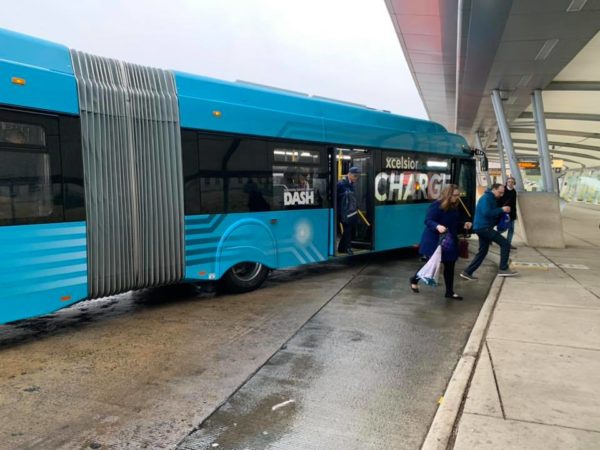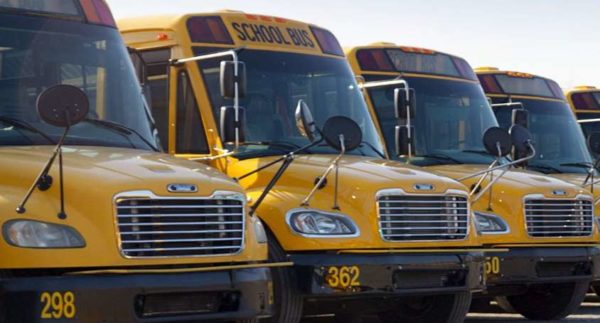The Alexandria City Council will consider making electric scooter rides cheaper in the poorest areas of the city at its meeting on Tuesday night (March 12).
Council will vote at City Hall (301 King Street) on allowing staff to apply for a $200,000 grant from the Better Bike Share Partnership’s Living Lab Program. The city would have to contribute $20,000 toward the effort, which is intended to increase the ridership with an outreach campaign and by lowering prices for electric scooters and e-bikes in Arlandria and the West End.
“The City will work with local community organizations to build awareness for micromobility equity programs and facilitate new member sign ups,” city staff wrote in a presentation going before Council. “This program would offset costs associated with Dockless Mobility trips that start or end within designated equity zones.”
Alexandria has tried to expand ridership in the two areas since launching its Dockless Mobility Program in 2019. Consequently, the city’s three permitted operators (Bird, Lime and Spin) must operate a percentage of their fleet within Arlandria (5%), west of Interstate 395 (10%) and between I-395 and Quaker Lane (15%).
Exactly how much riders who live in Arlandria and the West End will save is unclear, but the non-electric Capital Bikeshare has a program that allows low-income riders to ride their bikes for $5 per year.
The Living Lab Program is a partnership between the City of Philadelphia, the National Association of City Transportation Officials and the nonprofit People For Bikes. If the city is chosen for a grant, the program would be implemented this fall and run until Spring 2026, after which it would be evaluated, according to the staff presentation.
The city’s draft resolution is below.
WHEREAS, in 2021, the City Council of the City of Alexandria adopted a dockless mobility permit program that includes requirements to encourage equitable deployment and usage across the city; and
WHEREAS, in 2023 the Better Bike Share Partnership (BBSP) announced a Living Lab Program intended to address key barriers to access and use of shared micromobility; and
WHEREAS, City staff submitted a letter of interest and received an invitation to submit a full proposal; and
WHEREAS, the City Council of the City of Alexandria desires to submit an application to Better Bikeshare Partnership (BBSP) for up to $200,000 to participate in the BBSP Living Lab Program for 2024-2026; and
WHEREAS, these funds are requested to fund efforts to increase membership numbers in the Dockless Mobility and Capital Bikeshare equity programs, and to reduce the costs associated with dockless trips that either start or end within designated equity zones in the city.
NOW, THEREFORE, BE IT RESOLVED that the City of Alexandria hereby supports this application for an allocation of up to $200,000 through the BBSP Living Lab Program for 2024-2026.
BE IT FURTHER RESOLVED, that the Alexandria City Council hereby grants authority for the City Manager to apply for funds, allocate an additional $20,000 as a required 10% local match, and execute project administration agreements, as well as other documents necessary for approved projects.
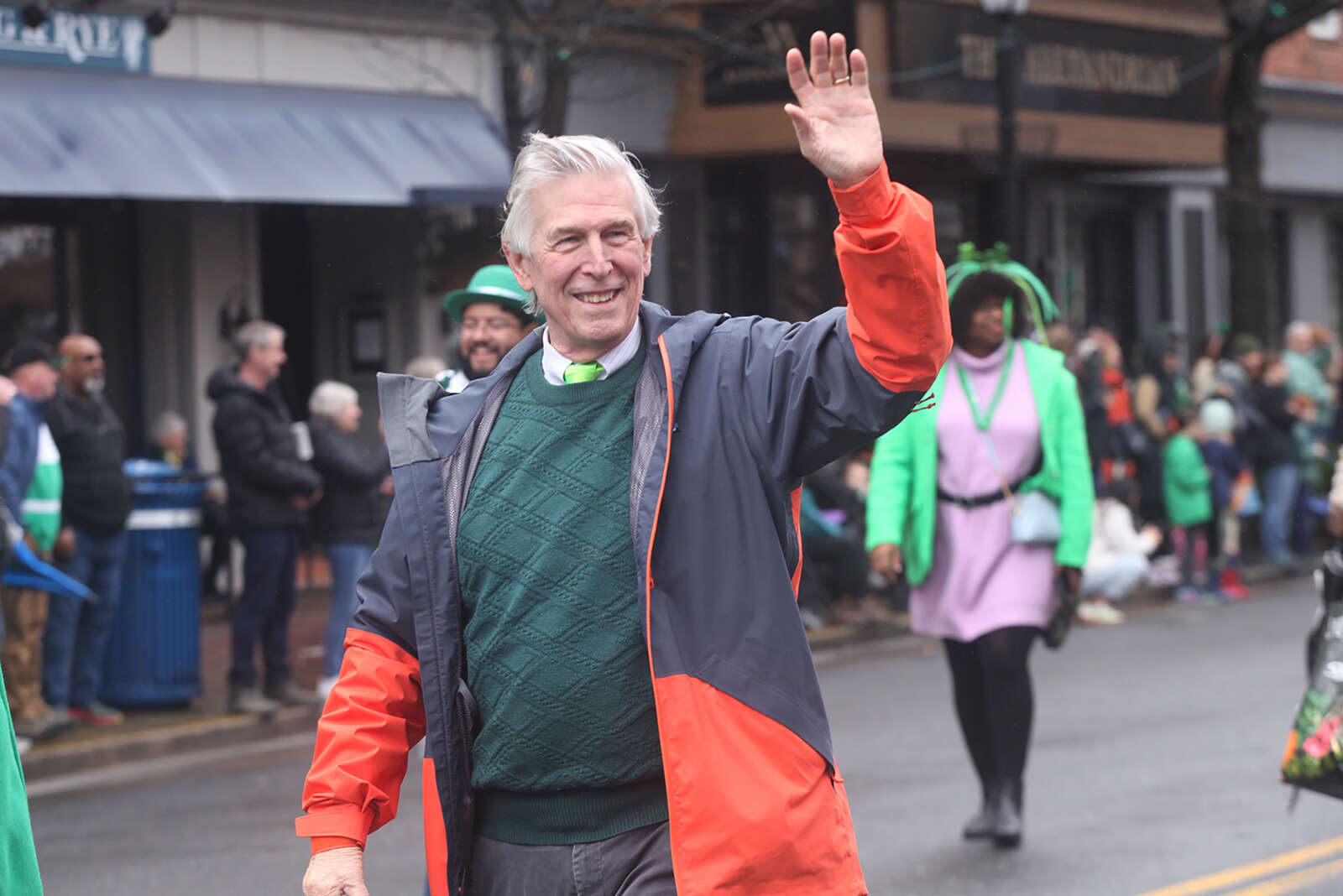
Alexandria is getting $3.5 million in federal funds to pay for public safety, transit, affordable housing and flooding infrastructure projects, Northern Virginia Congressman Don Beyer (D-8th) announced today.
“Even in the minority amid a divided and chaotic Congress, I am laser focused on helping my constituents and benefitting Northern Virginia,” Beyer said in a statement.
Beyer secured a total of $13 million federal funding in the 2024 Consolidated Appropriations Act, which the House of Representatives approved on Wednesday, to pay for 15 projects in Alexandria, Arlington and Fairfax County. The Senate is expected to approve the legislation next week, Beyer’s office said.
The Alexandria projects are:
$1 million for on-route electric transit bus opportunity chargers. The funding would be used to fund the construction and implementation of up to two on-route opportunity fast chargers within the City of Alexandria, which would support charging requirements of a full 100% Zero Emissions Battery Electric transit bus fleet. The chargers would be constructed in strategic locations throughout the City and the DASH bus network to help ensure that the future fleet of 100+ Zero Emissions transit buses can meet the demand of DASH’s 24/7 service, serving the community of Alexandria
$963,000 for the Virginia Tech “Smart Mobility Lab.” The funding would be used to establish Smart Mobility Lab (SML) operations and invest in initial research and technology development where gaps exist to attract and leverage industry engagement. The SML will be sustained in future years through publicly and privately sponsored research from industry and government partners. Some smart mobility technologies that may be deployed in the SML include: a data exchange system for integrating data from various systems deployed in the SML while providing security and appropriate access for research and development opportunities; smart intersection solutions that identify conflicts and improve vulnerable road users’ safety; adaptive lighting on roadways that adjust with changing weather conditions and traffic; implementation of customizable features (like real-time red light patterns changes) to accommodate traffic flow; and the analysis and creation of mobility hubs to connect multiple modes of transportation and make commuting easier.
$670,000 for a pilot program for crime and violence prevention. This supports funding enhanced technology, including In-Car Cameras, Fixed License Plate Readers (LPRs), and Surveillance Trailers, in the City of Alexandria. This funding will assist Alexandria’s law enforcement agency in its ongoing efforts to reduce incidents of violent crime and gun violence in the Alexandria community. The Alexandria Police Department will use these funds to invest in cutting-edge technology and equipment that will significantly enhance its ability to deter, respond, investigate, and successfully prosecute violent crimes.
$850,000 for the restoration of affordable housing at the 1022 Pendleton Street Boarding House. The project will allow the City of Alexandria to work with property owners to preserve unique, affordable housing in our community while renovating a building with historic, cultural and architectural significance. The boarding house currently includes 8 housing units with deeply affordable rents, as well as shared living space and room for the restoration of retail/commercial space original to the property.
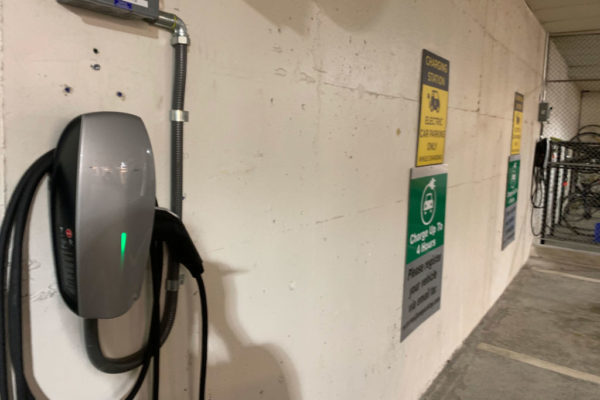
Old Town could be getting a little more wired with a new policy change that would make it easier for private property owners to install electric vehicle charging stations.
The new proposal, scheduled for discussion at the Wednesday (Dec. 7) meeting of the Board of Architectural Review (BAR), would allow city staff to approve electric vehicle charging stations, which currently require a full BAR hearing.
“At the December 7, 2022, hearing staff will present a BAR administrative approval policy for electric vehicle (EV) charging stations,” the report said. “The proposed administrative approval policy would allow staff to administratively approve wall and ground-mounted EV charging stations on private properties in the Old and Historic District and Parker-Gray District.”
The stations would still be required to meet some established criteria. According to the report, stations must be minimally visible, located in the side or rear yard and can be no more than six feet tall. It would require all conduits for wall-mounted charging stations to be painted to match the wall.
Failure to meet these requirements would not result in denial, per the report. Instead, it would require BAR approval at a public hearing.
“In addition, using good judgment, staff may find that a proposed EV charging station project may need full Board review, in which case the application would be docketed,” the report said.
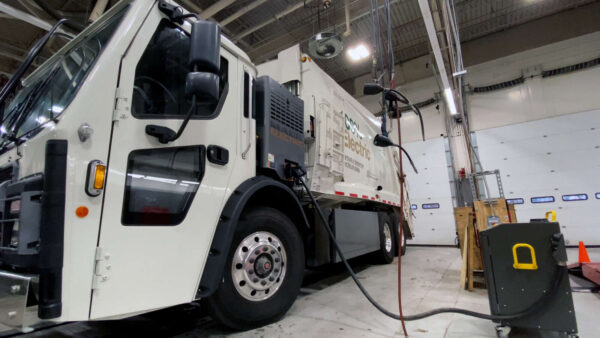
(Updated 4:25 p.m.) When trash pick-up comes around, it might be a little quieter than usual.
Alexandria’s Department of Transportation and Environmental Services (T&ES) said the city is testing out new electric trash trucks.
“This week, our crews are test-driving electric refuse trucks,” the department said on Twitter. “They’re quieter and deliver pollution reduction benefits”
Right now, city staff is test-driving one electric refuse truck for a week to better understand how it could be used in the city, Director of T&ES Yon Lambert tells ALXnow.
“The electric refuse truck is ideal for urban areas like ours because we take garbage collection to a local waste-to-energy facility, versus a landfill that would require a longer trip,” Lambert said. “Staff in the City’s Fleet Management Division of Transportation & Environmental Services is responsible for the maintenance of the truck, including charging it overnight, while a team from Resource Recovery is responsible for using it on routes to collect household garbage.”
The plan, according to Lambert, is to spend the week test driving the truck to gauge how it could be used to help reduce emissions and fuel consumption.
Lambert said the switch is part of a broader effort to the city’s roughly 800-vehicle fleet more sustainable. These vehicles are used in everything from household garbage collection to construction site inspections.
T&ES isn’t the first city service to venture into electric vehicles. City bus service DASH has been working toward adding 20 electric buses to its fleet — in addition to the 14 already in service — by 2025. The program has hit some stumbling blocks, though, like challenges with hilly terrain and cold weather.
“Our team will monitor how the refuse truck performs while it’s on collection routes this week,” Lambert said. “I believe that over time, we will do our due diligence and record data for this. These manufacturers have solid records of having reliable trucks available.”
Lambert said the truck is being tested as part of a week-long demo by truck company Mack at no cost to the city.
“We are exploring ways to build sustainability and resiliency to protect our City and environment now and for the next generation,” Lambert said. “This test drive will help the City gauge if this is a way we can continue working toward our sustainability goals. If the electric refuse truck is a viable option for us, it could be considered in a future year budget process.”
Lambert says he believes Alexandria is the first municipality in Northern Virginia to test drive an electric refuse truck.
“We hope this inspires other municipalities to also consider sustainability options,” he said.
We've got our eyes on a sustainable future ♻️🌎
This week, our crews are test-driving electric refuse trucks. They're quieter and deliver pollution reduction benefits.#alexandriava #alexandriaproud #publicworks #electrictruck #wastemanagement #macktrucks pic.twitter.com/KtcyluLlxL
— Alexandria Transportation & Environmental Services (@AlexandriaVATES) November 29, 2022
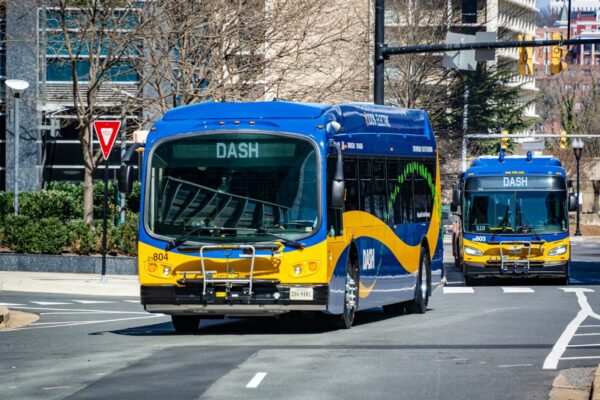
Electric buses have had a big boost this past month in Alexandria, with DASH laying out future plans for its all-electric fleet and Alexandria City Public Schools (ACPS) welcomed five new electric buses to the school’s fleet.
But electric buses have also faced some technological hurdles as well. DASH leadership noted that the buses struggle with hills and highways, and they also lack some of the heating of traditional diesel buses where the heat is supplied by the output from the engine.
DASH reported that the new electric buses have been less expensive in maintenance and operational costs than the older diesel buses — a claim ACPS echoed earlier this week — but also said the recharging ports have had a tendency to become suddenly non-functional and it can be difficult to get contractors out to have them fixed in a timely manner. Perhaps most importantly, electric buses are a significant environmental improvement over diesel buses.
Overall, DASH is hoping to have a fully-electric bus fleet by 2025 with all diesel hybrids phased out by 2027.
Photo via DASH/Facebook
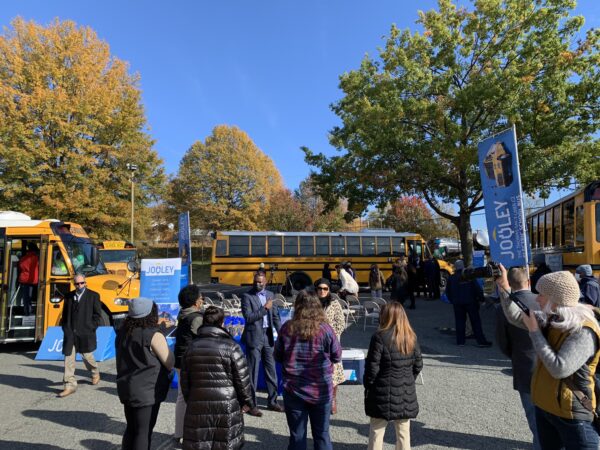
Alexandria’s bus service DASH isn’t alone in starting its electric conversion; yesterday Alexandria City Public Schools celebrated the addition of five new electric buses to the school system’s bus fleet.
At an event yesterday, ACPS and Dominion Energy leadership celebrated the launch of the new buses.
“In a unique public-private partnership, the Dominion Energy program provided the batteries and charging stations needed to operate the five buses that ACPS purchased for the same price as diesel models,” ACPS said in a press release. “The electric school buses are part of ACPS’ commitment to sustainability and hybrid vehicles. The new buses operate entirely by electrical power, help store electricity and stabilize the power grid while creating a quieter ride for students.”
https://twitter.com/tchrnme29824/status/1460791509201137667
The schools’ shift toward electricity comes as the citywide bus service DASH also is moving toward having a full-electric fleet, though DASH leadership said the buses have encountered some issues with heating and hills.
Like DASH, though, ACPS said the electric buses come with an economic benefit to the city — costing 60% less to maintain and operate compared to diesel buses.
The ACPS event was also one of the increasingly few celebrations where Dominion was welcomed with open arms in Alexandria. The energy company has been in hot water with the City of Alexandria after a series of catastrophic power failures one year after Dominion representatives told city leadership that earlier power failures weren’t emblematic of larger problems.
Photo via Abdel Elnoubi/Twitter
Looking ahead to a time after the coronavirus pandemic is over, Alexandria is working on overhauling its electric vehicle infrastructure.
The aim of the new effort, called the Electric Vehicle Infrastructure Readiness Strategy project, is to examine current electric vehicle charging needs and try to predict where and how those needs will spread.
“The Electric Vehicle Infrastructure Readiness Strategy project develops an electric vehicle charging infrastructure strategy as a roadmap to anticipate the needs of City residents, workforce members and visitors as transportation options transition from reliance upon conventionally fueled vehicles to electric vehicles,” Bill Eger, the city’s energy manager, said in an email.
The project was funded in the fiscal year 2020 budget as part of a broader “Green City” effort that included switching the city government’s vehicles to electric. Efforts have already included replacing diesel school buses with electric ones and adding new electric buses to DASH.
Eger said the aims of the project are to evaluate the future need for electric vehicle charging, identify optimal locations and recommend certain infrastructure options, like hardware and operational models.
Part of the strategy will also involve reviewing the city’s zoning, codes, permitting and other bureaucracy to change them in ways that will promote and anticipate vehicle charging needs.
“[The strategy will] recommend policies, approaches and synergies for locating electric vehicle charging infrastructure at businesses, multi-unit dwellings, single-family homes, right-of-way, and other locations,” Eger said. “Synergies with the City’s vehicle fleet electrification, public transit bus electrification and other forms of mobility will also be evaluated.”
This program is identified as a key program to advance smart mobility and Environmental Action Plan 2040 goals. This initiative includes community engagement to evaluate priorities and opportunities.
The timeline for the plan remains unknown. It was planned to be brought forward at the Transportation Commission meeting earlier this month before that meeting was canceled, so future plans might have to take a back seat to the city planning for the coronavirus pandemic.
File photo
Alexandria’s DASH bus system is inviting the public to provide input on a new zero-emissions electric bus.
The 60-foot-long Xcelsior CHARGE XE60 bus can carry more than 120 people, and will be available for the public to take a test ride late this week. The event is happening on Wednesday from 4-6 p.m. at Market Square (301 King St.).
DASH has been experimenting with the bus since last week in an effort to replace its older articulated (connected by a joint) buses. The bus is also being tried out on various routes this week, including one used by Mayor Justin Wilson on Monday morning.
A little excitement on my Monday morning commute: @DASHBus is trying out articulated electric buses! pic.twitter.com/3YAfvcGzLi
— Justin Wilson (@justindotnet) February 10, 2020
The bus is made by New Flyer of America, and was provided to the city free of charge during the demonstration.
Bus Features:
- Highest battery storage capacity and range of any zero-emissions bus available in the United States.
- Ability to serve all current or future routes within the City (navigates tighter turns than many current DASH buses due to special turning technology)
- Nearly doubles passenger capacity for routes with overcrowding issues (carries 120-130 passengers vs. 80 on current DASH buses)
- 3 articulated buses can replace 4 standard buses, reducing long term operating and capital costs
- Remedies bunching issues on routes where too many buses create service reliability issues
Photo via Justin Wilson/Facebook
Alexandria is one of more than a dozen localities in Virginia — including Arlington, Fairfax and Prince William counties — that will be receiving electric school buses by the end of 2020, Dominion Energy announced today.
The first phase of a project to replace diesel-powered buses entirely will start with distributing a total of 50 electric school buses to 16 school divisions spread out across the state. It’s unclear how many buses Alexandria will receive.
Dominion said the locations were selected based on the benefit the bus batteries would bring to the electric grid. Per a press release:
The electric school buses will serve as a grid resource by creating additional energy storage technology to support the company’s integration of distributed renewables such as solar and wind. The “vehicle-to-grid” technology leverages the bus batteries to store and inject energy onto the grid during periods of high demand when the buses are not needed for transport. The buses also provide environmental and health benefits through reduced emissions and reduce operation and maintenance costs for schools by up to 60 percent.
The press release noted that Thomas Built Buses, a North Carolina-based company that specializes in building school buses, was chosen as the vendor for the first phase of the project.
The second phase of the project would, with state approval, expand the program to 1,000 additional buses by 2025. Phase three would replace 50 percent of all diesel buses by 2025 and 100 percent by 2030.
Photo via Thomas Built Buses/Facebook


